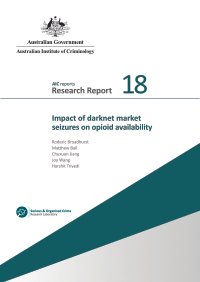By Roderic Broadhurst, Matthew Ball, Chuxuan Jiang, Joy Wang and Harshit Trivedi
Opioids, including the highly potent synthetic opioids fentanyl and carfentanil, are commonly sold on illicit cryptomarkets or Tor darknet markets. Data collected throughout 2019 from 12 large darknet markets that sold opioids enabled observation of the impact of law enforcement seizures and voluntary or scam market closures on the availability of fentanyl and other opioids.
Trends in opioid and fentanyl availability before and after law enforcement interventions indicate whether market operators and sellers are deterred and whether market closures lead to displacement, dispersal or substitution. Evidence of all of these outcomes was present in both descriptive and trend analyses, although most effects were short lived. Market closures, especially law enforcement seizures, reduced the availability of opioids, in particular fentanyl, as well as increasing prices and displacing vendors to other markets. Market closures also led vendors to substitute fentanyl for other opioids or other illicit drugs.
Research Report no. 18. Canberra: Australian Institute of Criminology, 2021. 73p.



